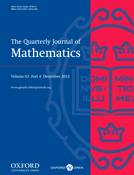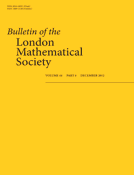
POSITIVITY
Scope & Guideline
Pioneering Research in Mathematics and Computer Science
Introduction
Aims and Scopes
- Functional Analysis:
The journal emphasizes the role of positive operators, particularly within Banach and Hilbert spaces, exploring their properties, spectra, and applications to various mathematical problems. - Optimization Theory:
There is a strong focus on both single-objective and multi-objective optimization problems, particularly those involving positivity constraints and optimality conditions. - Order Theory and Lattice Structures:
Research often delves into the order properties of various mathematical structures, including vector lattices and Banach lattices, highlighting the significance of order in functional analysis. - Differential Equations:
The journal includes studies on positive solutions for differential equations, particularly nonlocal and elliptic problems, indicating a commitment to understanding positivity in dynamic systems. - Quantum Mathematics:
Recent papers indicate a growing interest in the interplay between positivity and quantum theory, particularly in the context of quantum operators and Markov chains.
Trending and Emerging
- Advanced Optimization Techniques:
There is an increasing emphasis on robust and nonsmooth optimization, particularly in the context of uncertain multiobjective programs, showcasing the need for sophisticated mathematical tools. - Nonlinear Analysis:
The journal is witnessing a trend towards nonlinear approaches in various mathematical problems, especially in the context of differential equations and optimization, indicating a shift away from linear paradigms. - Quantum and Noncommutative Analysis:
A noticeable increase in studies related to quantum mathematics and noncommutative operator theory reflects a growing interest in the implications of positivity in quantum systems. - Applications in Applied Mathematics:
Emerging themes suggest an increasing application of positivity concepts in fields such as statistical mechanics and optimization, indicating a broader relevance of the journal's focus. - Lattice Theory Applications:
The journal is expanding its scope to include more applications of lattice theory in various mathematical contexts, indicating a trend towards integrating order theory with functional analysis.
Declining or Waning
- Classical Inequalities:
The journal has seen a decrease in papers focused specifically on classical inequalities, such as those traditionally studied in analysis, signaling a potential shift towards more complex, modern inequalities. - Basic Operator Theory:
Papers that deal with foundational topics in operator theory, such as elementary properties of bounded linear operators, seem to be less frequent, indicating a move towards more specialized or advanced topics. - Elementary Functional Spaces:
Research on basic functional spaces without additional structures or complexities appears to be declining, possibly as the focus shifts to more intricate spaces with specific properties.
Similar Journals

QUARTERLY JOURNAL OF MATHEMATICS
Advancing Mathematical Frontiers with Every IssueQuarterly Journal of Mathematics, published by Oxford University Press, stands as a pivotal resource for the mathematical community, focusing on a broad spectrum of topics in the field of mathematics. With its esteemed history dating back to 1930, this journal continues to foster innovative research and discussions, providing a platform for scholars to share their findings and insights. Although the journal currently holds a Q3 classification in mathematics (miscellaneous) and is ranked #207 among general mathematics publications in the Scopus database, its commitment to quality and rigorous peer review ensures that it remains relevant and insightful. Researchers, professionals, and students alike will find the Quarterly Journal of Mathematics an invaluable tool for advancing knowledge and understanding in various mathematical disciplines, making it an essential addition to any academic library.

Analysis Mathematica
Pioneering insights in theoretical and applied mathematics.Analysis Mathematica is a distinguished academic journal dedicated to the field of mathematics, focusing specifically on the varied aspects of analysis. Published by Springer International Publishing AG and based in Hungary, this journal has been an essential platform for scholarly communication since its inception in 1975. With a broad scope that encompasses theoretical developments and applications in mathematical analysis, it serves as a conduit for innovative research and discourse among mathematicians and researchers alike. While it currently holds a Q3 ranking in both Analysis and Miscellaneous Mathematics categories as of 2023, contributing authors are encouraged to elevate its impact through substantial contributions. Although not currently an open-access journal, Analysis Mathematica remains accessible through various academic databases, making it an invaluable resource for professionals, students, and researchers striving for excellence in mathematical analysis.

Journal of Mathematical Analysis
Exploring New Dimensions in Mathematical AnalysisThe Journal of Mathematical Analysis, published by UNIV PRISHTINES in Serbia, offers a dedicated platform for the dissemination of innovative research in the fields of mathematical analysis and applied mathematics. With an ISSN of 2217-3412 and a convergence period from 2020 to 2024, this journal aims to foster significant advancements in both theoretical and practical aspects of mathematics. Categorized in the Q4 quartile for Analysis, Applied Mathematics, and miscellaneous Mathematics as of 2023, it serves as an essential resource for researchers and professionals alike, providing key insights into the evolving landscape of mathematical inquiry. Although it is an open access journal, facilitating global readership, its Scopus rankings reflect its emerging status, with rankings indicating a 51st percentile in Mathematics (miscellaneous) and 28th percentile in Applied Mathematics. This journal not only aims to contribute to academic discourse but also seeks to bridge gaps between mathematical theory and real-world applications, making it a vital resource for students and professionals engaged in the complexities of mathematical research.

Annales Fennici Mathematici
Empowering the Future of Mathematical ResearchAnnales Fennici Mathematici is a prestigious academic journal published by Suomalainen Tiedeakatemia based in Helsinki, Finland. With an ISSN of 2737-0690 and an E-ISSN of 2737-114X, this journal has quickly established itself as an essential resource in the field of mathematics since its inception in 2021. It boasts an impressive Q1 categorization in Mathematics (miscellaneous) for 2023, highlighting its impact among top-tier mathematical publications. Currently, it holds a Scopus rank of #135 out of 399 in General Mathematics, placing it in the 66th percentile among its peers, ensuring visibility and relevance for its published works. The journal is committed to providing a platform for innovative research and the dissemination of mathematical discoveries, making it an invaluable resource for researchers, professionals, and students looking to expand their knowledge and engage with contemporary mathematical challenges.

Advances in Operator Theory
Illuminating Complexities in Operator TheoryAdvances in Operator Theory is a premier journal dedicated to the exploration of innovative and foundational research within the disciplines of Algebra and Number Theory, as well as Analysis. Published by SPRINGER BASEL AG, this journal provides a vital platform for the dissemination of high-quality research and theoretical advancements in the realm of operator theory. With a commendable impact factor and categorized in the Q3 quartile for both Algebra and Number Theory and Analysis in 2023, it holds significant standing in the Scopus rankings, substantiating its relevance in the mathematical community. The journal encourages open discussions and lively exchange of ideas among researchers, professionals, and students alike, fostering an environment conducive to scholarly growth and collaboration. Based in Iran at PICASSOPLATZ 4, BASEL 4052, SWITZERLAND, it has been actively publishing since 2016, making substantial contributions to its field through rigorous peer-reviewed articles. As an essential resource for anyone invested in the forefront of mathematical research, Advances in Operator Theory continues to illuminate complex topics and inspire future inquiries.

BULLETIN OF THE LONDON MATHEMATICAL SOCIETY
Cultivating Knowledge and Innovation in MathematicsThe BULLETIN OF THE LONDON MATHEMATICAL SOCIETY, published by Wiley, is a distinguished journal that serves as a vital resource in the field of mathematics. With its ISSN 0024-6093 and E-ISSN 1469-2120, this journal has consistently provided a platform for innovative research and scholarly discourse since its inception in 1969. Recognized for its quality, it currently holds an impressive Q1 ranking in the mathematics category, a testament to its significance in disseminating influential findings and trends in the mathematical sciences. Researchers and practitioners can rely on the BULLETIN for its comprehensive coverage of both theoretical and applied mathematics, which caters to a diverse audience ranging from professionals to students alike. Though it does not currently offer Open Access options, its articles can be accessed through institutional subscriptions, ensuring that significant works reach the academic community effectively. With contributions that span over five decades, the journal continues to shape mathematical research and inspire future advancements in the discipline.

ACTA SCIENTIARUM MATHEMATICARUM
Elevating Understanding through Rigorous ResearchACTA SCIENTIARUM MATHEMATICARUM, published by SPRINGER BIRKHAUSER in Switzerland, is a distinguished journal focusing on the fields of mathematical analysis and applied mathematics. With an ISSN of 0001-6969 and an E-ISSN of 2064-8316, this journal serves as a critical platform for disseminating high-quality research that bridges theoretical and practical aspects of mathematics. Although currently categorized in the Q3 quartile for both Analysis and Applied Mathematics as of 2023, the journal strives to enhance its impact on the mathematical community by offering a perfect blend of rigorous research and innovative applications. Researchers, professionals, and students can benefit from the journal’s commitment to advancing knowledge in mathematics, despite the absence of open-access options. The mailing address for correspondences is 233 SPRING STREET, 6TH FLOOR, NEW YORK, NY 10013. As mathematics continues to evolve, ACTA SCIENTIARUM MATHEMATICARUM positions itself as a valuable resource for those looking to contribute to and stay informed about the latest developments in this vibrant field.

Dissertationes Mathematicae
Pioneering Insights in Mathematical Disciplines.Dissertationes Mathematicae is a prestigious academic journal published by the Polish Academy of Sciences Institute of Mathematics (IMPan), renowned for its contributions to the field of mathematics since its inception. With an impressive Q1 ranking in the miscellaneous mathematics category for 2023 and positioned at Rank #73 out of 399 in General Mathematics according to Scopus, this journal serves as a pivotal platform for disseminating high-quality research and innovative theoretical developments. Spanning from 2000 to 2024, it focuses on a broad range of mathematical disciplines, encouraging interdisciplinary collaboration and advancing mathematical understanding globally. While it currently does not offer open access, the journal is highly regarded in academic circles and continues to attract submissions from respected researchers and institutions. With a commitment to excellence and a notable impact factor, Dissertationes Mathematicae plays a crucial role in the ongoing development of mathematical theories and applications, making it an essential resource for researchers, professionals, and students alike.

Collectanea Mathematica
Connecting researchers to the forefront of mathematical discovery.Collectanea Mathematica is a distinguished academic journal published by SPRINGER-VERLAG ITALIA SRL, dedicated to the field of mathematics, with a specific focus on both applied and theoretical aspects. Renowned for its rigorous peer-review process, the journal aims to advance knowledge in various mathematical disciplines, showcasing high-quality research that significantly contributes to the understanding of mathematical principles. With an impressive impact factor, and categorized in Q1 and Q2 quartiles for miscellaneous and applied mathematics respectively, Collectanea Mathematica plays a vital role in the academic community, catering to researchers, professionals, and students alike. The journal spans its convergence years from 2006 to 2024, reflecting a rich history of excellence and innovation in mathematical literature. With its strategic position within the Scopus rankings, it remains a pivotal resource for those seeking to stay at the forefront of mathematical research.

Banach Journal of Mathematical Analysis
Unveiling New Dimensions in Algebra and AnalysisWelcome to the Banach Journal of Mathematical Analysis, a distinguished publication under the auspices of SPRINGER BASEL AG, dedicated to the field of mathematical analysis and its applications. With a strong reputation reflected in its Q2 ranking within both Algebra and Number Theory as well as Analysis categories for 2023, this journal serves as a pivotal resource for researchers and professionals striving to advance their understanding and contributions to the mathematical sciences. As an esteemed platform featuring innovative research from around the globe, the journal promotes open discourse among practitioners of various mathematical disciplines. Although currently not an open access journal, it enhances visibility through rich content, consistently ranked with notable Scopus metrics, including impressive standings in both algebraic structures and analytic methods. Join a vibrant community of scholars who are shaping the future of mathematics by exploring the latest insights and methodologies published within these pages.